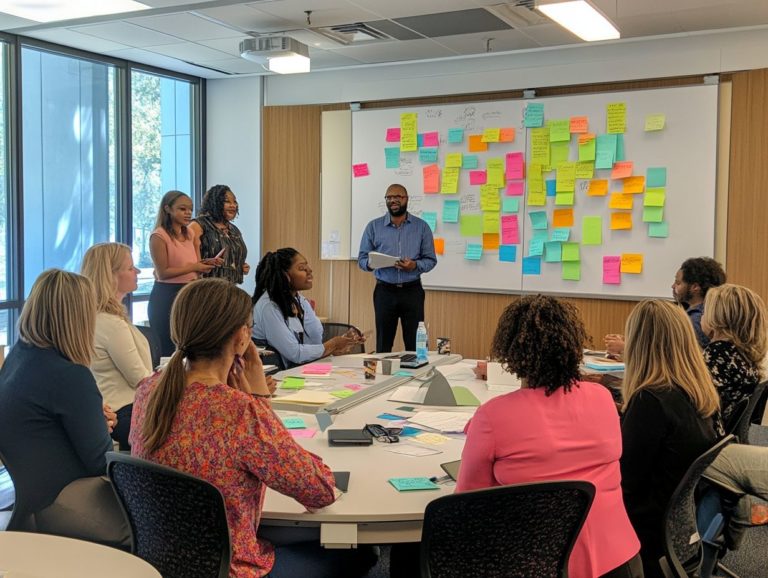The Future of Leadership Development
In today s fast-paced world, effective leadership stands as a cornerstone for both organizations and individuals seeking success.
This article explores the exciting world of leadership development! You ll discover the critical importance of emotional intelligence in nurturing strong leaders, while also addressing the common challenges that can impede progress.
As we look toward the future of leadership development, you ll find actionable strategies and insights designed to help cultivate the leaders of tomorrow. Together, let s embark on this essential journey toward impactful leadership.
Contents
- Key Takeaways:
- The Importance of Leadership Development
- Current Trends in Leadership Development
- The Role of Emotional Intelligence in Leadership
- Challenges in Leadership Development
- The Future of Leadership Development
- Strategies for Effective Leadership Development
- Frequently Asked Questions
- What is the future of leadership development?
- How will technology impact leadership development in the future?
- What are some key skills that will be important for future leaders?
- Will the future of leadership development focus more on individual development or team development?
- How can organizations prepare for the future of leadership development?
- What impact will globalization have on the future of leadership development?
Key Takeaways:

- Leadership development is crucial for both organizations and individuals, as it can drive growth and success in the workplace.
- With advancements in technology, leadership development is evolving and incorporating new approaches such as online learning and virtual coaching.
- Emotional intelligence plays a significant role in effective leadership and can be developed through self-awareness and practice.
The Importance of Leadership Development
Leadership development stands as a cornerstone for both organizations and individuals. It serves as a key to growth and refines essential leadership skills.
This vibrant leadership culture profoundly influences employee engagement and overall business success.
By investing in leadership development, you enable your organization to cultivate a cadre of frontline leaders. These leaders possess the knowledge of how businesses work and the capability to tackle complex organizational challenges.
This strategic approach not only drives effective change management but also enables these leaders to positively influence their peers.
Ultimately, leadership development fortifies your workforce and enhances the sustainability of your organization in today s rapidly evolving digital economy.
Why It Matters for Organizations and Individuals
Leadership development is vital for you, both as an individual and as part of your organization. It equips you with essential skills that boost productivity and nurture a positive workplace culture.
By investing in your leadership development, your organization ensures that you re engaged and well-prepared to navigate the complexities of change. This journey encourages you to embrace new challenges and adapt effectively, leading to higher retention rates and greater job satisfaction.
Skill reinforcement through targeted training and ongoing coaching conversations is key in this process. This enables you to guide your team with confidence.
This investment also fosters personal and professional growth, creating a thriving workplace where you and your colleagues can contribute meaningfully and succeed together.
Current Trends in Leadership Development
Current trends in leadership development reveal a remarkable shift towards harnessing technological advancements. By incorporating tools like virtual classrooms and self-guided study options, you can significantly elevate the learning experiences for frontline leaders navigating a digital economy and hybrid workplace.
Technological Advancements and New Approaches
Technological advancements have truly transformed leadership development. Innovative solutions like virtual classrooms promote interactive skill reinforcement and meaningful coaching conversations.
You can now leverage AI-driven coaching tools that provide personalized feedback. This helps you pinpoint areas for growth and track your progress over time.
Online platforms offer flexible learning pathways, allowing you to engage at your own pace while accommodating diverse learning styles and schedules.
These innovations tackle the limitations of traditional training methods and foster a more inclusive environment. They enable every leader, regardless of their background, to enhance their skills.
As a result, organizations experience a significant boost in leadership effectiveness, cultivating a culture of continuous growth and adaptability.
Are you ready to take the first step in your leadership journey? Let s get started!
The Role of Emotional Intelligence in Leadership

Emotional intelligence is crucial for effective leadership. It embodies essential traits such as self-awareness, empathy, and the capacity to influence others. By cultivating these qualities, you foster trust and build stronger relationships within your teams and organizations.
This not only enhances collaboration but also sets the foundation for a thriving workplace culture.
Understanding and Developing Emotional Intelligence
Understanding and developing emotional intelligence is about refining your guiding skills as a leader. This helps you connect with and influence your team effectively. This vital component of leadership helps you grasp the emotional dynamics at play within your team, fostering healthier work environments and boosting cooperative efforts.
By recognizing your own emotions and those of others, you can skillfully navigate conflicts between team members and nurture a culture of empathy. To assess your emotional intelligence, consider using self-assessment tools and seeking feedback from your peers.
Improvement can be achieved through targeted training programs that emphasize active listening, emotional regulation, and interpersonal communication.
You might also find value in self-guided study, focusing on mindfulness practices and reflective journaling. These approaches help you cultivate greater self-awareness and resilience, ultimately enhancing your leadership effectiveness.
Challenges in Leadership Development
Despite the critical importance of leadership development, your organization may encounter several challenges that can undermine the effectiveness of your initiatives.
These obstacles can include resistance to change, a lack of engagement in training programs, and difficulties in tackling organizational problems head-on.
Common Obstacles and How to Overcome Them
Common obstacles in leadership development, such as resistance to new practices and insufficient employee engagement, can significantly hinder the effectiveness of training initiatives.
When employees feel disconnected from the content, their lack of participation in coaching conversations becomes evident. Ineffective training materials only serve to dampen enthusiasm further.
To tackle these challenges, implement strategies that encourage active involvement. Creating incentives that reward participation and integrating feedback mechanisms will ensure that employees feel heard and valued.
By tailoring training sessions to address the specific challenges within your team, you can enhance interest and relevance, ultimately fostering a culture of continuous learning and improvement.
The Future of Leadership Development
The future of leadership development will harness a fusion of innovative practices and new technologies, tailored to meet the dynamic demands of both organizations and employees navigating the complexities of a hybrid workplace, including the role of gender in leadership development.
Predictions and Potential Innovations

Get ready for a significant focus on technology! Innovations like AI-driven coaching tools are set to revolutionize how leadership skills are taught and applied.
As you embrace these advancements, you might notice a shift away from traditional mentorship toward personalized, data-informed coaching experiences tailored just for you. The integration of technology can provide real-time feedback, enabling you to adapt your leadership style to meet your team’s specific needs more effectively.
Imagine engaging with virtual reality simulations that offer immersive learning opportunities; these would allow you to practice critical decision-making in high-stakes environments. Such tools not only elevate your coaching capabilities but also cultivate a culture of continuous improvement, ultimately fostering more agile and responsive leadership practices across various industries.
Strategies for Effective Leadership Development
Implementing effective strategies for leadership development is crucial for you and your organization if you’re aiming to cultivate a strong leadership culture that encourages ongoing learning.
By prioritizing this development, you lay the groundwork for a dynamic environment where leaders can thrive and evolve.
Best Practices and Actionable Tips
Best practices for leadership development offer actionable insights that help you enhance your coaching skills and nurture a collaborative work environment.
Focus on creating an atmosphere where open communication thrives. This allows team members to voice their ideas and concerns freely.
Actively involving them in decision-making processes can significantly elevate their engagement and motivation levels.
Incorporating regular feedback mechanisms into your training programs is essential. Consider using structured feedback sessions that encourage both managers and employees to share valuable insights.
By dedicating time to these tailored strategies, you can cultivate a more engaged workforce, paving the way for both individual and collective success.
Frequently Asked Questions
What is the future of leadership development?
The future of leadership development programs is constantly evolving. It adapts to the changing needs and demands of the business world by utilizing new technologies, developing diverse leadership styles, and promoting ongoing learning.
How will technology impact leadership development in the future?

Technology will play a crucial role in leadership development. It will provide opportunities for virtual learning, remote coaching, and using data to guide leadership skills and decision-making.
What are some key skills that will be important for future leaders?
Future leaders will need to possess skills such as adaptability, resilience, and the ability to lead diverse teams in a globalized world, in addition to traditional skills like communication and problem-solving.
Will the future of leadership development focus more on individual development or team development?
The future of leadership development balances individual and team growth. While individual coaching and training remain important, a key focus will also be on the role of mentorship in leadership development to foster teamwork and innovation.
How can organizations prepare for the future of leadership development?
Organizations can prepare by investing in continuous learning opportunities, creating a culture of feedback and growth, and embracing diversity and inclusion in their leadership development programs.
What impact will globalization have on the future of leadership development?
Globalization will significantly affect leadership development. It will require leaders to have a global mindset, understand cultural differences, and effectively lead diverse teams in international business environments.






